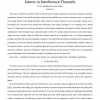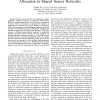512 search results - page 13 / 103 » Reducibility among equilibrium problems |
WINE
2009
Springer
14 years 2 months ago
2009
Springer
Abstract. We are interested in mechanisms that maximize social welfare. In [2] this problem was studied for multi-unit auctions and for public project problems, and in each case so...
CORR
2007
Springer
13 years 7 months ago
2007
Springer
This paper considers the problem of how to allocate power among competing users sharing a frequency-selective interference channel. We model the interaction between these selfish ...
INFOCOM
2012
IEEE
11 years 10 months ago
2012
IEEE
Abstract—Wireless sensor networks are evolving from singleapplication platforms towards an integrated infrastructure shared by multiple applications. Given the resource constrain...
CDC
2009
IEEE
14 years 11 days ago
2009
IEEE
We consider a plant the dynamics of which switch among a family of systems. Each of these systems has a single stable equilibrium point. We assume that a constraint region for the...
SAGT
2009
Springer
14 years 2 months ago
2009
Springer
In a scheduling game, each player owns a job and chooses a machine to execute it. While the social cost is the maximal load over all machines (makespan), the cost (disutility) of ...



